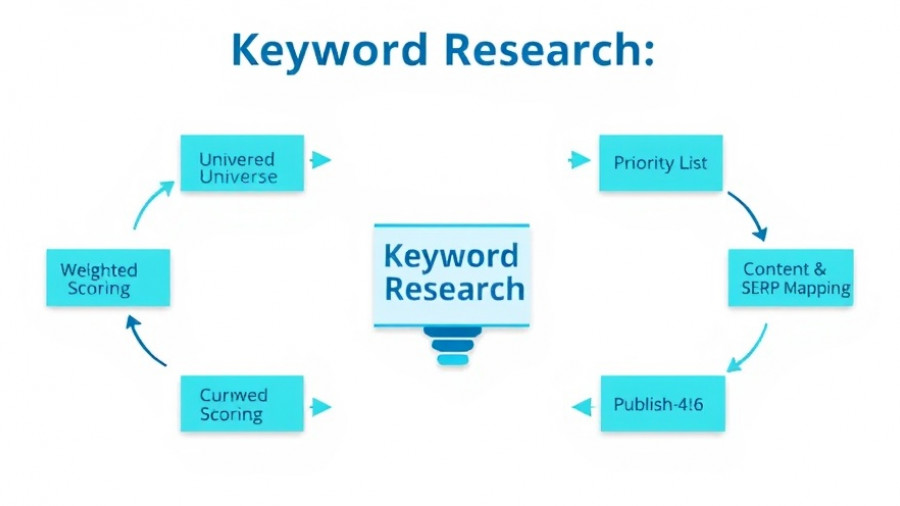
Understanding SEO: Why It Matters for Psychologists
As a psychologist, you may wonder why digital marketing seems to have overtaken traditional methods. The truth is that today's clients are increasingly sourcing therapy options online, seeking specific professionals with the services they need. SEO for psychologists plays a pivotal role in ensuring that when potential clients turn to search engines, your practice stands out as a top choice.
Research shows that over 90% of individuals seeking a therapist utilize Google as their first point of contact. When clients search for treatments like "anxiety therapy" or "psychologist near me," your visibility on these searches can significantly impact your practice's success.
Strategic Keyword Research: The Foundation of SEO
Effective SEO starts with keyword research. What terms are potential clients using when searching for help? Understanding these keywords allows you to create content that is not only relevant but also tailored to their specific needs. Tools like Google Keyword Planner can provide insight into popular phrases such as:
- "Therapist near me"
- "Cognitive Behavioral Therapy in [City]"
- "Child psychologist in [Region]"
By aligning your website's content with these commonly searched phrases, you’ll increase your chances of appearing in search results, ultimately driving traffic to your practice.
The Importance of Local SEO
Local SEO strategies are essential for psychologists who cater to specific geographical areas. This includes setting up and optimizing your Google My Business profile. Ensure that your contact information, hours, and services are accurate and inviting. Encouraging current and past clients to leave positive reviews can also enhance your practice's credibility and visibility.
Moreover, consistent citations across various online directories, with accurate NAP (Name, Address, Phone Number) details, help build trust with search engines, thereby improving your local SEO standing.
Website Optimization: Creating a User-friendly Experience
Your website should be more than just a digital business card; it should offer an engaging experience for visitors. This means ensuring it is mobile-friendly, loads quickly, and provides a clear navigation path. By optimizing on-page elements such as title tags, meta descriptions, and headers with relevant keywords, you can improve the readability and searchability of your content.
Incorporating multimedia elements like videos or infographics can help to engage users further and keep them on your site longer—a factor that positively influences SEO rankings. Blog posts discussing topics like anxiety management techniques or what therapy sessions involve can resonate with potential clients while incorporating SEO best practices.
The Role of Content Marketing in SEO
Content marketing is your ally in the quest for SEO success. Regularly writing informative pieces that address common mental health concerns not only establishes your expertise but also provides content rich in targeted keywords. This could range from topics about coping strategies for stress to guides on what to expect from therapy. Content updates signal to search engines that your site is active, aiding in boosting your rankings.
Building Backlinks and Enhancing Authority
Backlinks are external links that point to your website and indicate authority in your field. High-quality backlinks from reputable organizations can significantly enhance your practice's standing in search engine results. Engage in networking, guest blogging, or collaborating with fellow mental health professionals to cultivate these valuable links.
Leveraging Social Media for Increased Visibility
Don’t underestimate social media's impact on your SEO efforts. Platforms like Facebook, LinkedIn, and Instagram can help draw visitors to your website and increase engagement with your content. Sharing insightful blog posts, articles, and mental health tips can establish your presence and authority in the online space. Plus, each share on these platforms acts as a signal, prompting search engines to index your content higher.
Tracking SEO Success and Adaptation
To ensure your SEO strategy is effective, leverage tools like Google Analytics to analyze key metrics—such as organic traffic, keyword rankings, and the conversion rates of visitors into clients. Regularly assessing these metrics allows you to refine your approach based on what proves successful.
As you track these elements, adaptability becomes essential. What works one month might not yield the same results a few months later, so staying current with SEO trends is crucial for your practice's growth.
Conclusion: Starting Your SEO Journey
Implementing a robust SEO framework can take time, but the benefits are well worth the investment. Increased visibility translates to more inquiries, consultations, and ultimately, clients. Start small by optimizing your website, focusing on local SEO, and providing content that resonates with your audience's needs. Your digital marketing strategy will evolve, and with persistence, your practice can flourish in the ever-competitive digital landscape of mental health services.
 Add Row
Add Row  Add
Add 




Write A Comment